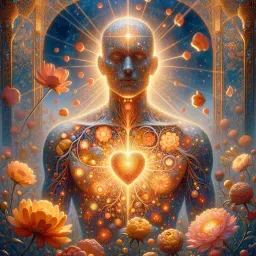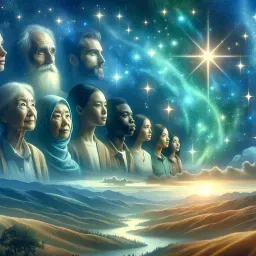”It’s not until you lose everything
that you can truly appreciate everything“

0
0
0
0
- Meaning
- The meaning of the phrase suggests that experiencing loss or deprivation can lead to profound realizations about the value of what one possesses. This sentiment aligns with psychological concepts such as post-traumatic growth, where individuals find a new appreciation for life after overcoming difficult experiences. Historically, it echoes sentiments found in literature from various periods that deal with hardship leading to enlightenment and growth.
- Allegory
- The image captures an individual in a moment of reflection and gratitude at a mountain's peak, illustrating the contrast between their past struggles in the dark valley below and their current clarity. The sunrise symbolizes new beginnings and hope, while the open arms convey acceptance and appreciation. Clouds serve as a reminder of the past, enriching the individual's experience and understanding of beauty in life.
- Applicability
- In personal life, this phrase can serve as a reminder to have gratitude for what we currently have. It encourages mindfulness and appreciation during times of prosperity, reducing the tendency to take things for granted and preparing one to face challenges with resilience.
- Impact
- The phrase has impacted self-help culture, often quoted in motivational speeches and literature aimed at encouraging resilience and gratitude. It has inspired discussions about the value of hardships and personal growth following adversity.
- Historical Context
- While the exact origin date is unknown, the phrase likely became popular in the late 20th to early 21st century, reflecting modern values of self-awareness and mindfulness amidst economic and social changes.
- Criticisms
- Critique of the phrase could emerge from perspectives that question whether loss is a necessary precursor to appreciation. Some argue that appreciation can arise from abundance without needing to experience loss. Alternatively, one could contend that continuous loss could lead to despair rather than appreciation.
- Variations
- Variations of this phrase exist across cultures, such as in certain East Asian philosophies emphasizing balance – the notion that suffering can increase appreciation for joy. While interpretations vary, the core theme remains that adversity fosters a greater understanding of gratitude.
-

You are a toy!
-

Your identity is your most valuable possession. Protect it.
-

Oh yes, the past can hurt.
-

She warned him not to be deceived by appearances, for beauty is found within.
-

The only way to get what you want in this world is through hard work.
-

It’s called a hustle, sweetheart.
-

You have to try. You have to care.
-

It’s all part of the experience.
-

When you wish upon a star, makes no difference who you are.
-

You don’t have to be perfect to be amazing.
-

There’s magic in the air tonight, and anything can happen.
-

You control your destiny — you don’t need magic to do it.
No Comments